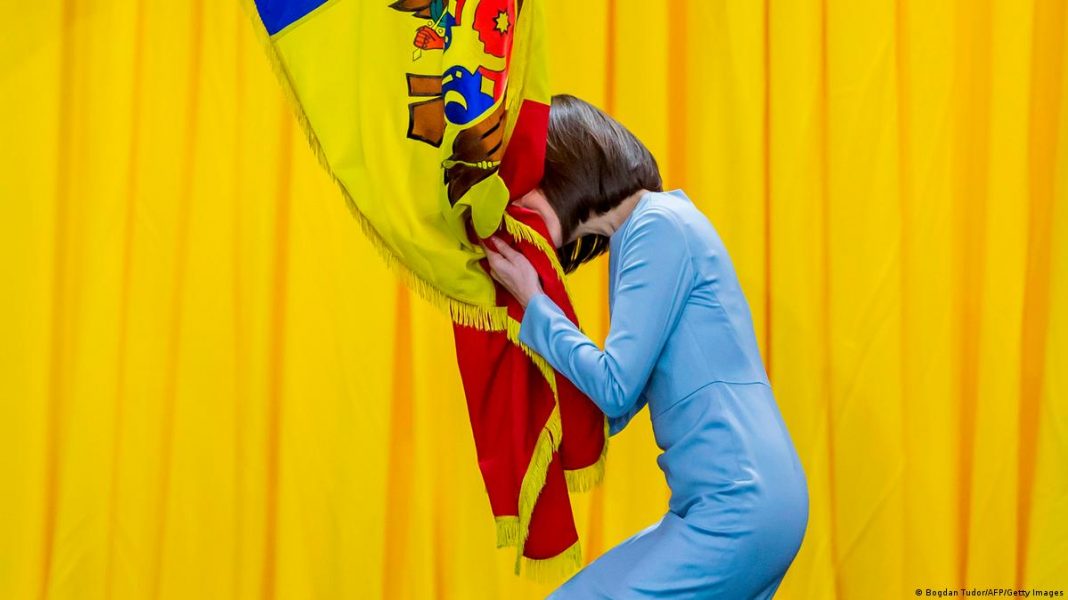2024 could be a turning point and decisive for the Republic of Moldova. The country has begun negotiations to join the EU and will hold presidential elections at the end of the year. According to experts, the election campaign will primarily be geopolitical in nature. Against the backdrop of the war in Ukraine, a profound shift in sentiment is occurring in Moldovan society. Those who until recently were classified as a conditional group of pro-Russian voters now have a demand for new political forces capable of representing their interests without regard to the Kremlin. By launching a full-scale invasion of Ukraine, Putin dealt a heavy blow to everyone who believed in the “Russian world” in Moldova. However, despite this, there are still a sufficient number of voters in the country, and even entire regions, for example, Gagauzia, who look with hope towards Moscow. This means that the Kremlin will not give up attempts to fight for Moldova and consolidate it in its sphere of influence.
To achieve this, according to Moldovan President Maia Sandu, the Kremlin is trying to change its strategy: “Moscow realised that they can no longer rely only on pro-Russian parties,” said the Moldovan president. Since most Moldovan citizens want European integration, she noted that now “… the Kremlin is trying to play both on the side of the pro-European choice and the pro-Russian choice.” Therefore, the stakes will be as high as possible in the upcoming presidential and next parliamentary elections (in 2025). In essence, Moldova’s European future is at stake.
In this article, Ascolta analyses the current socio-political situation in Moldova, as well as studies the main influencing factors and identifies recent trends on the eve of the presidential and parliamentary elections.
This Content Is Only For Subscribers
Will there be a second term for Sandu?
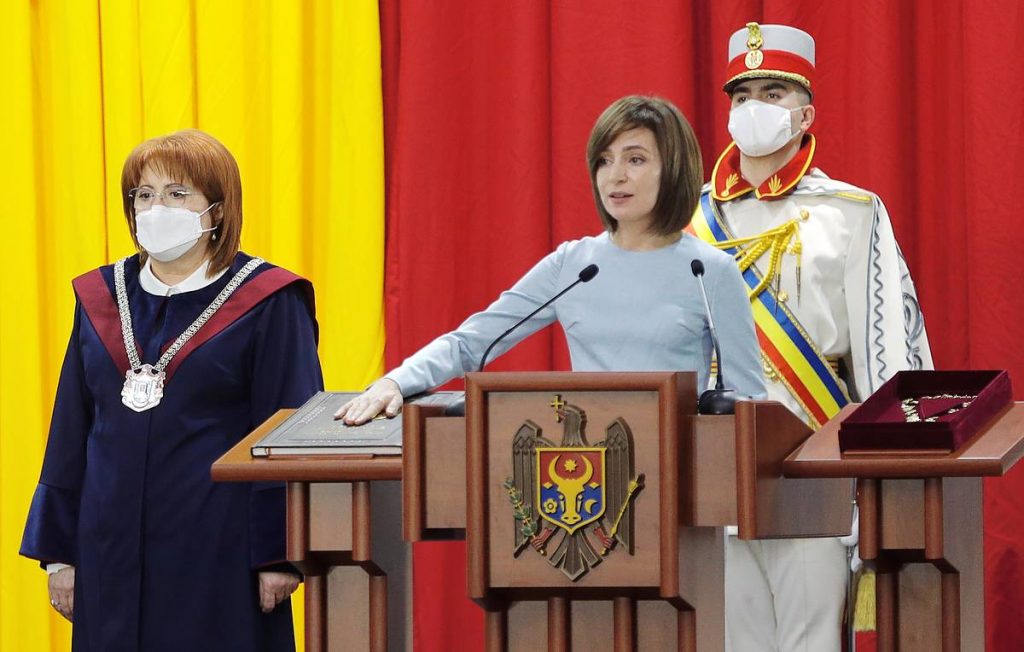
Moldovan President Maia Sandu has already announced her desire to be re-elected for a second term: “I have pledged to do everything in my power to fulfil the mission of European integration. We still have many steps to take, and I am ready to continue if you show confidence in obtaining a new mandate in 2024,” Sandu said.
This will be Sandu’s third presidential election. The first attempt in 2016 was unsuccessful. She lost to Igor Dodon. Four years later, a “rematch” took place, and in November 2020, Maia Sandu became the first female president in the history of independent Moldova.
According to the Constitution, Moldova is a parliamentary republic in which the post of president is broadly representative. However, suppose the parliamentary majority is formed from a pro-presidential party. In that case, the post of head of state acquires all the necessary powers and opportunities to carry out all possible reforms and a clear, targeted political line.
In the 2021 early parliamentary elections, Sandu’s PAS Action and Solidarity party achieved phenomenal success, gaining 52.8% of the vote and giving the president the tools she needed to implement reforms. It must be said that before the elections, many party members did not believe in the absolute victory of the pro-presidential party “Action and Solidarity”. However, a “miracle” happened! For the first time in 30 years, one pro-European force received full power in the country. The PAS party first owed its brilliant results to President Sandu, who became a propaganda “locomotive” for its political force.
The election results showed that Moldovan President Sandu’s “reset” of parliament was a brilliant success. Of the political forces that were part of the parliament of the previous convocation, only the Shor party, Dodon’s socialists, now in alliance with the communists, and the PAS party itself, which increased its representation from 15 deputies to 63, remained in it. At that time, many experts compared the convincing the victory of the pro-presidential party with the victorious electoral march across Ukraine of the Servant of the People party in the early parliamentary elections in 2019. In both the first and second cases, the result of the elections was the formation of a mono-majority.
Having barely gained power, President Sandu and her associates in 2022 faced crises unprecedented for Moldova. First, energy, which was associated with rising prices for Russian gas supplied to the country. Following the increase in gas prices, everything else began to rise in price. Then a full-scale war between Russia and Ukraine began. Moldova, one of the poorest countries in Europe, had to accept 80 thousand Ukrainian refugees almost simultaneously. Inflation soared and the economy almost collapsed. Moldovans felt the consequences of the crisis when they received payments for gas: thanks to EU assistance, the country was able to completely get rid of its dependence on Russian gas imports, but prices for it remained at record levels.
Many problems have arisen with electricity, the main supplier of which is Ukraine. Due to Russian missile attacks on Ukrainian energy infrastructure in November 2022, Moldova was left almost completely without electricity for two days. In addition, the usual supply chains were broken, and the cost of transporting goods – primarily agricultural products – soared. As a result, many local producers lost the opportunity to sell their products on such traditional markets as Russian and Belarusian. Despite the fact that, against the backdrop of unprecedented problems, the authorities managed to prevent an economic and social catastrophe, they were the ones who paid for everything that happened in the country with their reputation and rating, regardless of whether they put their efforts into solving the problems or not.
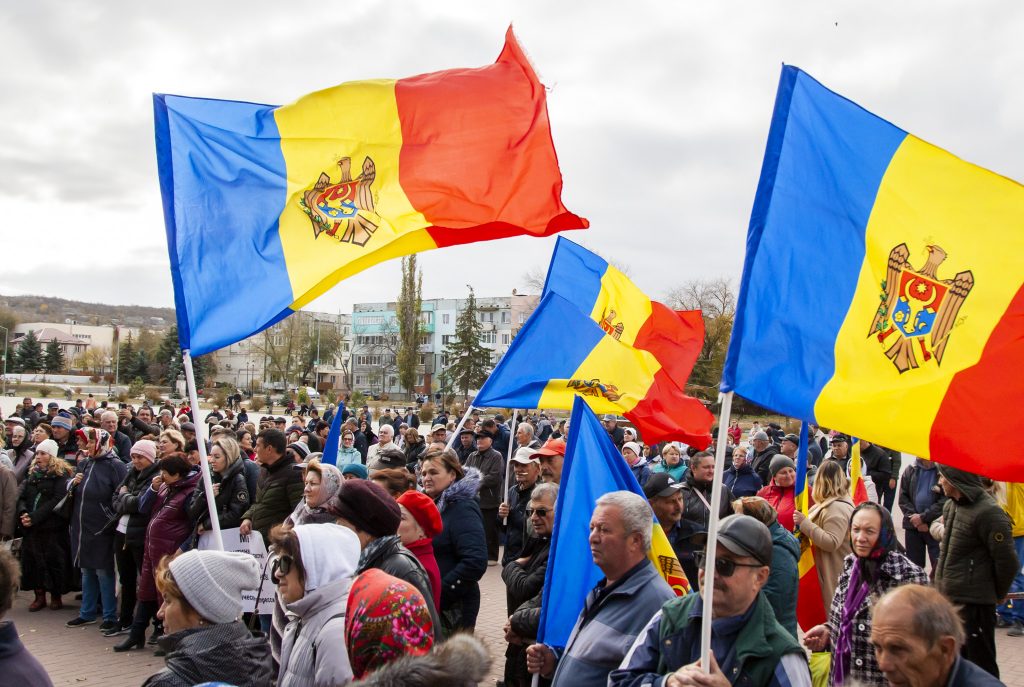
And as experts note, it doesn’t even help that during the reign of PAS there was not a single high-profile corruption scandal associated with its functionaries, and Sandu herself is an example of modesty and incorruptibility. The fact that not everything is in order in the economy was also evidenced by the resignation of the Prime Minister of the Republic, Natalia Gavrilitsa, who was close to President Sandu. She resigned as head of government a year and a half after starting work and with a high anti-rating. They say that the president personally persuaded her longtime and close ally to leave. Announcing her resignation on February 10, 2023, she could not hide her disappointment at the attitude of Moldovan citizens towards her and her colleagues: “If the Moldovan government had as much support at home as in the EU, in Brussels, we would have achieved much more.” According to her, the Moldovan government resigned without succumbing to “energy blackmail.”
“For the first time in the history of our country, the right bank will not consume gas supplied by Gazprom. Since last year, we have promised that we will create reserves and find alternatives to stop depending on one source. We have achieved this,” said Andrei Spinu, Minister of Infrastructure and Regional Development, in unison with the ex-Prime Minister.
Gavrilitsa also listed Moldova’s receipt of the status of a candidate country for membership in the European Union as one of her main achievements. However, the opposition accused the Gavrilitsa government of incompetence, ineffectiveness and inability to solve the country’s fundamental problems. The expert community of Moldova was ready for the resignation of the Gavrilitsa government. According to political analyst Alexei Tulbure, Natalia Gavrilitsa’s resignation was unsurprising: “Dissatisfaction with the results of the government’s work was growing. There are no promised reforms; nothing is happening in the economy. I was waiting for visionaries to come who would talk about what we would do, produce, and export. And everything is very pathetic. I don’t see reforms in education; there are no changes in medicine. There is unprecedented support in the West, there are new formats that support Moldova, they have received the status of a candidate country for the EU, but this is the president’s merit,” the expert emphasised.
The new head of the Moldovan government, Dorin Recean, is also a member of Sandu’s inner circle. Before his premiership, he was Advisor to the President of Moldova on National Defense and Security and Secretary of the Supreme Security Council. His appointment was greeted with enthusiasm in Moldova, and energetic action was expected from the government. As expert Alexey Tulbure notes: “In connection with the status of a candidate for accession to the EU, a window of opportunity has opened for us. It will be a disaster for the country if we miss the moment. We will be in the swamp for decades. This is a real prerequisite for modernisation; no other regional projects exist, and we must use this chance.”
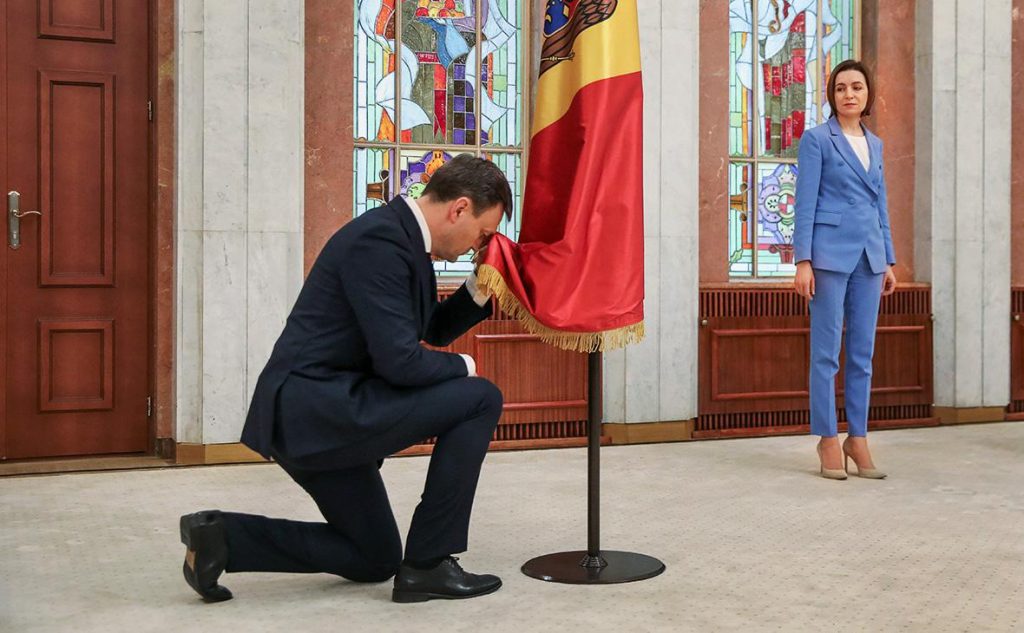
Having worked for a year, the government headed by Prime Minister Dorin Recean today also cannot boast to the Moldovan society that it is effectively solving the accumulated problems. Thus, on December 12, 2023, the local analytical centre “Expert Grup” presented an annual report on the state of the Moldovan economy in the context of European integration”, Macro-2023”. Experts noted high prices and rising poverty levels. As follows from the report, in 2022, due to high inflation, the level of absolute poverty in the country increased from 24.5% to 31.1% (absolute poverty – if the income per person is below the subsistence level of 2942 lei). At the same time, the share of absolute poverty in urban areas is 17.1%, and in rural areas – 40.3%. In addition, the labour shortage in Moldova will continue to increase. Moldova has one of the lowest rates of total employment in the region – 42% (in the region – about 60%). The labour shortage will increase from 8% in 2023 to 18% or 25% in 2026. Labour productivity in Moldova is two times lower than in Central and Eastern Europe, again indicating the predominance of low-added value production and services in the economy. According to the Expert Grup report, systemic problems in the Moldovan economy still do not allow for accelerating economic development.
Not everything is smooth with the reforms promised by Sandu’s team, which the “yellows” (the colours of the Action and Solidarity party) promised to carry out quickly and effectively when they were fighting for power. First, it was promised to reform the justice system – an eternal object of criticism both within the country and from Moldova’s foreign partners. Attempts to correct something in justice were clumsy and only caused scandals, making the authorities appear incompetent. Suffice it to recall the story of the resignation of Prosecutor General Alexander Stoianoglo, who, at the instigation of President Sandu, was removed from office and became involved in many criminal cases.
The attorney general is a political wild card in Republican politics. He has little leverage over political processes, but he is already a crushing force in conjunction with the president, prime minister or speaker of the country’s parliament. Stoyanoglo did not go in tandem with any of the political heavyweights. Having defined for himself the role of a champion of the rule of law, Stoyangolo found himself in a political squeeze between pro-Russian and pro-European forces, which acted in solidarity in his criticism.
In October 2023, the European Court of Human Rights concluded that the Moldovan state violated the ex-prosecutor general’s right to a fair trial. Lawyer and former Deputy Minister of Justice Nicolae Esanu then said that the ECHR decision demonstrates that those who dealt with the Stoianoglo case at the national level “are either legally illiterate or schemers who deliberately made decisions contrary to the Convention.”
Many experts point out that justice reform is only necessary for European integration. The reasons for the reform’s stalling lie in the lack of a deep analysis of the problems in this area and the authorities’ desire to create the appearance of political control over the prosecutorial and judicial systems.
Prime Minister Dorin Recean confirms that Moldova’s justice reform “still lags behind” and is “pulling the country back. “In Brussels, we met with the head and members of the European Commission, who appreciated our efforts to transform the country in accordance with European standards. But our justice reform is still lagging behind.”
According to the 2023 Corruption Perceptions Index, Moldova ranks 80th among 180 countries monitored, and some progress has been made in the fight against corruption. There were no new “thefts of a billion”, as in the days when oligarchs controlled the republic. But those involved in past scams built a vicious system in the prosecutor’s office and courts, worked in it, fabricated cases, and were never punished. Many were not even fired. And as President Sandu states, deep-rooted corruption in the republic remains a threat to national security.
The EU also recognises modest results in justice reform and the fight against corruption. Last year’s European Commission report on Moldova, on the one hand, states that there is progress in reforming justice. On the other hand, it points to protracted legal proceedings, low rates of case clearance, and a large number of pending cases, which negatively affect the efficiency of the judicial system.
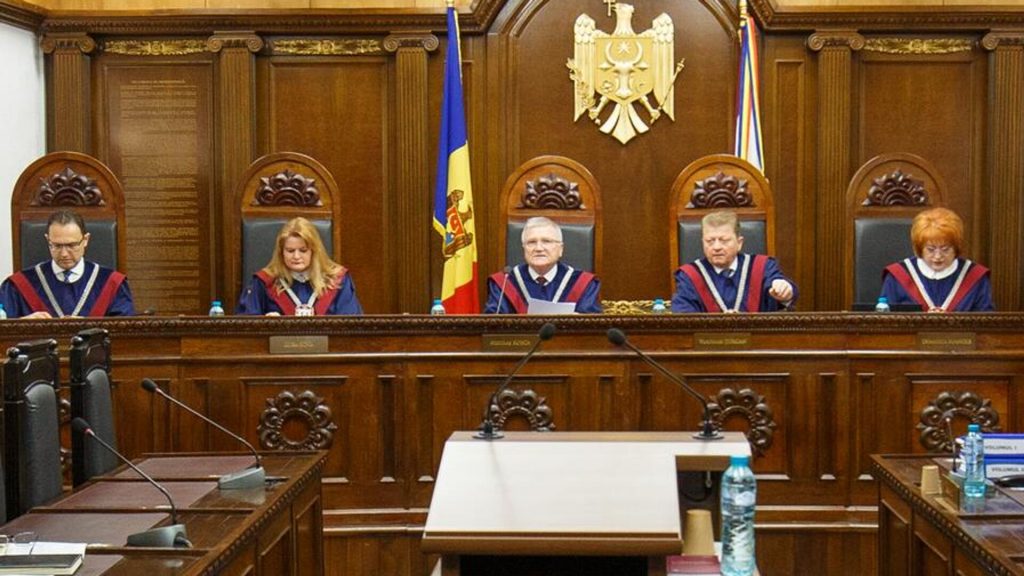
Experts also note that the authorities are not doing an excellent job of implementing reforms, about which they themselves have created inflated expectations with their promises. We can add mistakes in the humanitarian sphere to the economy’s miscalculations. A striking example is the law on renaming the Moldovan language to Romanian. The term “Moldovan language” was replaced by “Romanian language” in all laws, regulations and the Constitution of Moldova. From a practical point of view, this decision was symbolic because the literary Romanian and Moldavian languages are identical. However, with this decision, the authorities alienated those who consider themselves Moldovans, not Romanians. And especially the older generation, who associate Romania with the occupation during World War II.
Of course, on the one hand, power can be understood. In the context of full-scale Russian aggression against Ukraine, Moldova is trying to distance itself from Moscow. It is seeking rapprochement with the West and specifically with Romania, a country that is a member of the European Union and NATO. Renaming the state language is also a tool for achieving the desired European integration. This, by the way, is indirectly confirmed by President Sandu herself, declaring that the residents of Moldova will now speak Romanian, one of the official languages of the European Union.
Therefore, the intensification of Moldova’s process of European integration is dictated to a greater extent by external geopolitical factors: the deterioration of diplomatic relations with Russia, various trade embargoes, and the war in Ukraine, rather than the quality of the reforms being carried out in Moldova and the growing competitiveness of the Moldovan economy.
The deterioration of socio-economic indicators could not affect the ratings of the party in power, Action and Solidarity. According to recent polls, 20-25% of voters are ready to vote for the ruling PAS today. It is worth recalling that in 2021, the party won the elections with a result of 53%. According to a survey conducted by the International Republican Institute (IRI) at the end of last year, the president and the government have high anti-ratings. Voters are primarily concerned about economic problems esp,ecially rising electricity bills.
It is essential for Maia Sandu to be re-elected this fall. Parliamentary elections will follow the presidential elections in 2025. Sandu’s loss could be a fatal blow to the party in power she created. Apparently, this is why the referendum was launched, and the bet was placed on the most advantageous topic for the president – integration into the EU.
Speaking about “European integration”, we mean Sandu.
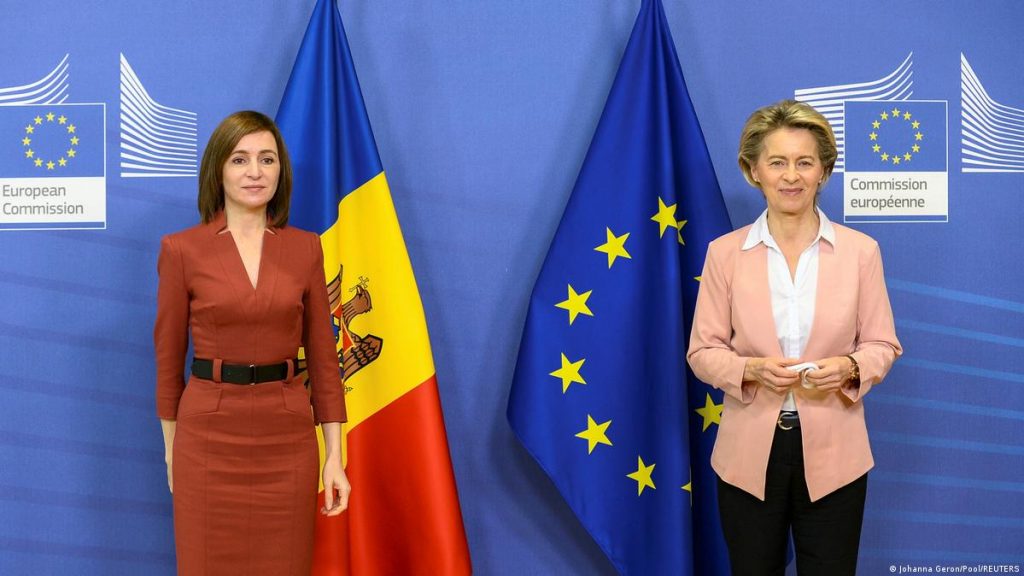
In contrast to solving internal problems, Moldova has achieved significant success precisely on the path of European integration. Events for the country unfolded rapidly: in 2022, Moldova received the official status of a candidate country for accession to the EU, and in February 2024, official negotiations for Moldova to join the European Union began.
This was largely facilitated by Russia’s full-scale aggression against Ukraine. In addition to military and financial assistance to Kyiv, Brussels decided to support Ukraine by moving to a new level of interaction. It was logical to extend this decision to Moldova, governed by a pro-European party that fully supported its neighbour at war with Russia. Since 2022, Kyiv and Chisinau have been moving forward synchronously. However, it would be biased to attribute everything to the war.
We must also credit the Moldovan authorities – they have taken a giant step forward on the path to the EU. Firstly, it was necessary to convince European partners that the republic should be transferred to a new level of interaction. After all, Brussels clearly saw that the reform of justice – one of the key areas for the EU – is almost not moving. And here, the tandem of Sandu and the now ex-Minister of Foreign Affairs Popescu brilliantly coped with their task of convincing European officials. Moldova admits that if Sandu and Popescu had not worked in this direction, it is not a fact that Moldova would have received candidate status and would have been allowed to negotiate.
In 2022–2023, the republic experienced a peak in foreign policy activity. The number of visits to Moldova by foreign foreign ministry leaders and top officials has increased significantly. In the spring of 2023, Maia Sandu gave a brilliant political performance, gathering thousands of people in a rally supporting European integration in Chisinau. It should be noted that no opposition force has ever attracted so many people to its protest rallies.
In June 2023, Moldova hosted the summit of the European Political Community, which was honoured by the presence of the heads of state and governments of 45 countries. The summit’s results not only strengthened Moldova’s position in the international arena but also brought tangible results in the form of increased financial assistance from the European Union, Great Britain and Norway. Such forums have never been held in the country before. All this could not but bear fruit. The finale of such activities was February 7, 2024, when official negotiations began on Moldova’s accession to the European Union. They were started by the head of the European Commission’s Directorate General for Neighborhood and Enlargement, Gert-Jan Koopman, and Moldovan Deputy Prime Minister Cristina Gerasimov. “We have entered the first stage of technical work on the accession of the Republic of Moldova to the EU,” Deputy Prime Minister Gerasimov said following a trip to Brussels.
The meeting marked the beginning of the screening. At the meeting, the Moldovan side received video presentations explaining EU legislation. After Moldovan officials get acquainted with them, they will have to prepare their materials, from which it will become clear what in national legislation already complies with EU standards and what needs to be worked on. Next, we must bring Moldovan legislation into line with European standards and carry out internal reforms. Screening is a technical and rather “boring” process, but the Moldovan authorities are determined to complete it quickly to move directly to negotiations with the EU. This is due not only to the fact that the ruling pro-presidential party “Action and Solidarity” considers joining the EU a strategic goal: President Sandu, for example, is confident that this can be achieved by 2030. European integration successes are also important in the context of domestic politics. The goal of the party in power is to remain at the helm. Maia Sandu’s victory in the presidential elections this autumn is the first step towards this.
To make Maia Sandu’s association with the European integration process even more robust, this fall, it was decided to hold a referendum on the country’s accession to the EU – so that it would occur on the same day as the presidential elections. Previously, the law prohibited combining national elections with a referendum. But the PAS party, which controls the majority in parliament, promptly voted for the changes, and such a combination became legal. Sandu explained the desire to combine the two votes by saying that the referendum on the choice of an external vector would determine the republic’s fate for years to come.
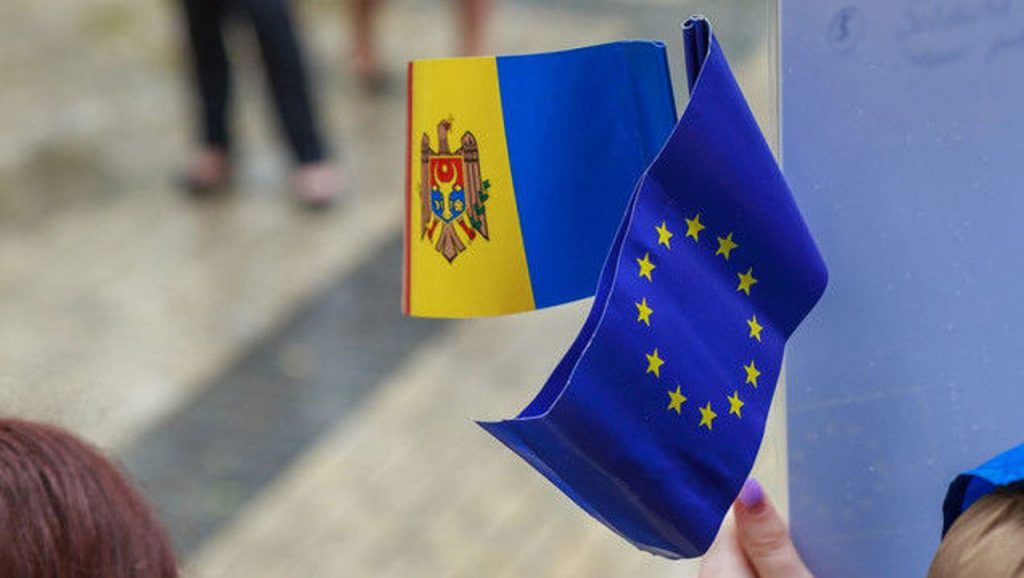
“We want as many people as possible to come to the polls. We know from experience that presidential elections have the highest voter turnout,” the president argued.
The plebiscite will become part of the election campaign of the current president. It should help mobilise the pro-European electorate, which currently has no other candidate than Maia Sandu. There are many pro-Western parties and politicians in Moldova, but there is no visible alternative to the current president. Sandu can be said to have a monopoly on the pro-European agenda, supported by concrete achievements. According to the Moldovan Constitution, foreign policy in a parliamentary republic is under the president’s authority. This includes negotiations and the conclusion of agreements. Therefore, the president is trying to clarify to everyone in the country: when you say European integration, you mean Sandu; when you say Sandu, you mean European integration.
The parliamentary opposition, represented by the Party of Communists and the Party of Socialists, criticised the president’s intention to combine elections with a referendum. She accused Sandu of intending to use the plebiscite to save the declining popularity of the head of state and the pro-government Action and Solidarity party. The leaders of these two parties and several non-parliamentary political forces refused to participate in consultations convened by the president on the issue of holding a referendum. Ex-President Dodon called on citizens to vote in the presidential elections but not to take a ballot to participate in the plebiscite.
“This referendum is an attempt to mislead our fellow citizens once again so that they forget about the problems created by Maia Sandu and the so-called “good people in good times.” We urge Maia Sandu not to participate in this political event because otherwise, a turnout will be ensured, in which Sandu will draw whatever result she wants,” notes Dodon.
As experts note, it is too early to say that Moldova’s European integration has become irreversible since society has no consensus on this matter. According to WatchDog analyst Andrei Curararu, there is a part of society in Moldova that negatively perceives the idea of European integration: “There is a tendency for European integration to become a “given”, but for this, ordinary people must feel the real benefits of negotiations with the European Union,” – said the expert.
Political analyst Dionys Cenusha believes that the “irreversibility” of Moldova’s European course will depend on the quality of reforms. At the same time, he does not exclude the possibility of turning the process of European integration into “oligarchisation under the European flag.”
According to Public Opinion Barometer (POB) polls, there really is no “mass support” for European integration in Moldova. As of August 2023, in a referendum on joining the EU, 49.7% of respondents would vote for joining (32.8% against). In 2022, the support figure was higher – 50.9%. Ironically, the highest support for European integration was in Moldova when the communists were in power – about 80%. One way or another, having saddled the topic of European integration, President Sandu is confidently moving towards his second presidential term. And, apparently, the opposition is not yet very successful in stopping its confident progress.
Is there an alternative?
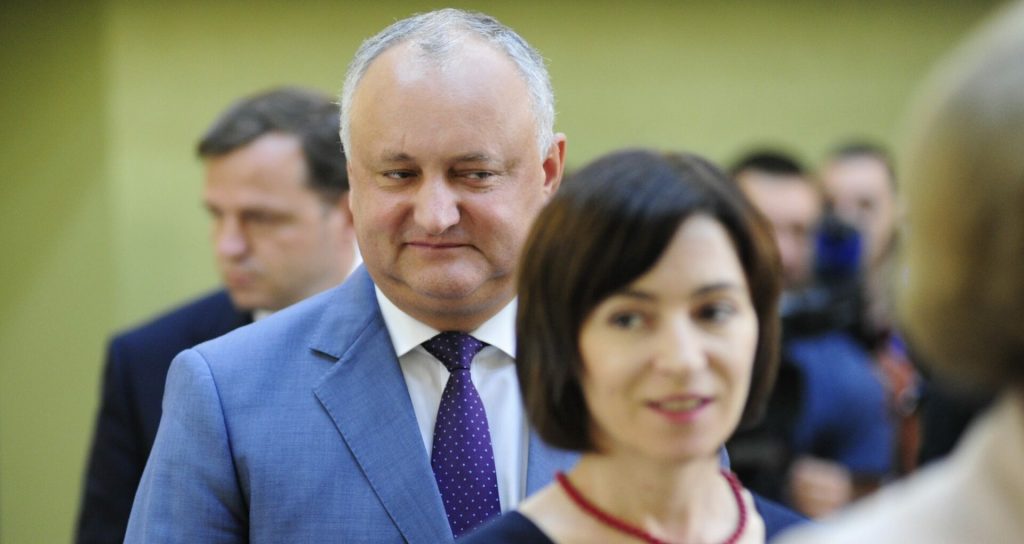
If Sandu has a monopoly on the pro-European agenda, then obviously, there must be an alternative. However, the current president does not yet have any clear competitors.
Member of the Moldovan Parliament and Secretary of the Parliamentary Committee for National Security, Defense and Public Order Constantin Staris notes that the opposition is fragmented and cannot unite efforts. This applies to both the left and right opposition. Although Starysh represents the Bloc of Communists and Socialists in parliament, he notes: “This is my opinion; I am not afraid to express it; it may even contradict the agenda of my party. I believe that we have topics for conversation with other political players who oppose this government. Otherwise, it won’t be easy. We need to work with both European and Western partners, proving that the European integration that the ruling party is pursuing is a discreditation of the European idea and all its principles.”
According to him, Maia Sandu has a fairly high rating, and despite the fact that it has dropped, other candidates have it several times lower. In his opinion, it is necessary to look for new faces and new leaders. He adds, “We risk coming to the presidential election campaign with the need to nominate just anyone who has a slightly higher rating than everyone else but still lower than hers. This way, we won’t get victory.”
Back in November 2023, analysing the results of local elections in Moldova, Ascolta noted the strengthening of the position of the young head of the Information and Security Service of the Republic of Moldova, Alexandru Musteata, who plays a vital role in the system of shadow politics in Moldova. Before he was appointed Head of the ISS, Mustiata headed the representative office of the Soros Foundation in Moldova and was an expert at the NATO Information and Documentation Center. Moldovan experts say that Mustiata has political ambitions. At some stage, the question of replacing Maia Sandu with Alexandru Mustiata as a candidate for the leadership of Moldova may arise. Almost half a year later, Ascolta still considers Mustiata as a very promising candidate for a new leader who could unite around himself that part of the electorate that supports the European vector of development but, for one reason or another, does not support the policies of Maia Sandu. In this case, it can be assumed that the two upcoming election campaigns will demonstrate the presence, or vice versa, of the absence of political ambitions of the young head of the Information and Security Service of the Republic of Moldova.
For many years, pro-European and pro-Russian politicians (the former were usually located on the right flank, and the latter on the left) divided influence and replaced each other in power. Russia’s invasion of Ukraine has upended the lives of pro-Russian political parties in Moldova. The war forced many of those who had previously advocated rapprochement with Moscow to reconsider their views. There is a demand in the country for new forces capable of representing the interests of Russian speakers but without regard to the Kremlin. These sentiments were felt by parties and politicians who, before the war, criticised the government for being too “European” and called for cooperation with Russia. Now, they scold the authorities not for the pro-European course but for its inept implementation. Such an evolution is not a unique case. Over the past two years, many Moldovan parties that had previously called for cooperation with Russia have become supporters of European integration. Among them are “Party of Collective Action – Civil Congress” by Mark Tkachuk, “European Left” by Grigory Petrenko, “Our Party” by Renato Usatii, “Party of Development and Unification of Moldova” by Ion Chicu.
For a long time, Igor Dadon was considered the Kremlin’s favourite. However, after the defeat in the 2020 presidential elections and initiating a corruption case, the politician’s rating seriously declined. Soon after the start of the war, in the spring of 2022, the socialists tried to bring their supporters into the streets, demanding the resumption of negotiations with Moscow. They were outraged by the challenging anti-Russian position taken by the Moldovan authorities. However, the protest quickly faded away. For example, the actions organised by Shor turned out to be much more powerful. In the fall of 2022, protesters set up a tent camp near the government building, refusing to disperse until the authorities agreed with Russia on a discount on gas. The protesters’ demands found a response in society. Due to the war in Ukraine, inflation in Moldova reached a record 30%, and the rise in prices for food and utilities hit especially hard. The rallies did not stop until winter.
After house arrest and criminal proceedings in April 2023, Igor Dodon emerged from the shadows. He again headed the Party of Socialists, the country’s largest and most influential opposition force. However, judging by the results of the 2023 local elections, its candidate is unlikely to win the 2024 presidential elections. Moreover, Dodon himself is no longer a popular leader. According to the results of opinion polls, Dodon is significantly losing to Maia Sandu. In the first round, 18% of respondents are ready to vote for him, and 29.4% are ready to vote for the current president.
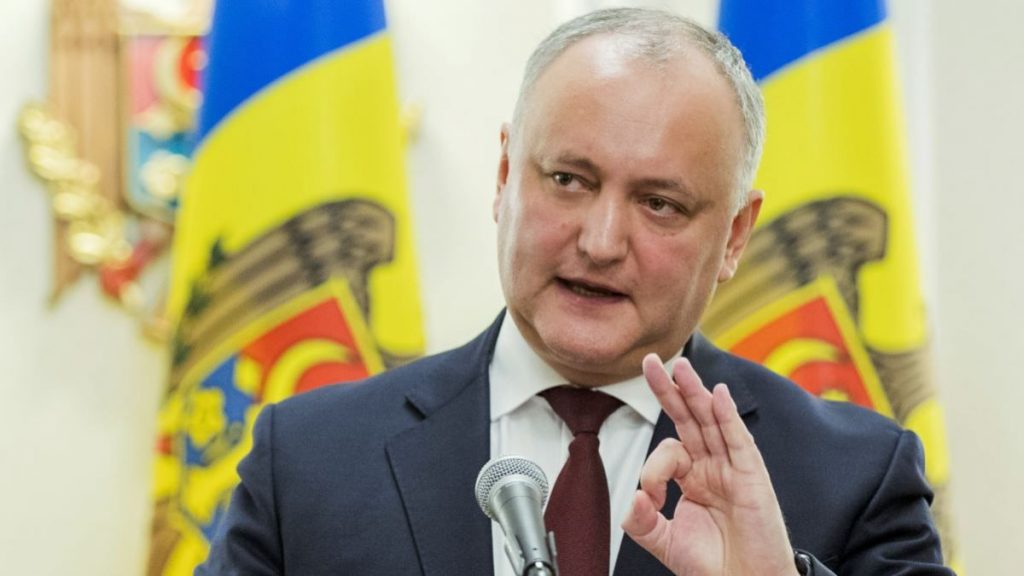
Dodon speaks vaguely and evasively about his participation in the upcoming presidential elections. Following the congress of the Socialist Party, which took place in December 2023, he said: “At this stage, I am not considering my participation in the presidential elections. If someone wants to find a compromise on the issue of appointing a single candidate, I am open to discussion. Socialists are ready to discuss this issue.” Although last November, on the air of one of the TV channels, he did not rule out his participation in the presidential campaign.
In addition, one of the EU Reporter materials very aptly notes that Dodon’s anti-Sandov rhetoric does not prevent the Party of Socialists from synchronously voting locally with the ruling PAS party after the local elections that failed for the government. This allowed the latter to occupy key positions in local governments and administrations. Asked about the unusual reversal, Dodon denied rumours of creating coalitions with his political opponents. “If there is anyone Sandu could thank for actually compensating the damage caused by her party’s humiliating performance in the last elections, it is her sworn enemy Igor Dodon,” the publication writes.
Rumour has it that Dodon has lost the credibility of his Kremlin handlers. They are not satisfied with the ex-president’s passivity. Now Moscow sees Ilan Shor as its new partner.
Ilan Shor is a well-known figure both in Moldova and abroad. In 2019, he left the Republic because he was facing a prison sentence for his involvement in a scheme to illegally withdraw $1 billion from three local banks in 2014. As a result, the politician was sentenced in absentia by a Moldovan court to 15 years in prison in 2023. Having settled in Israel, the Moldovan and Israeli citizen Ilan Shor declared his goal to remove President Maia Sandu and her team from power. They remotely developed an effective and vigorous political activity in Moldova.
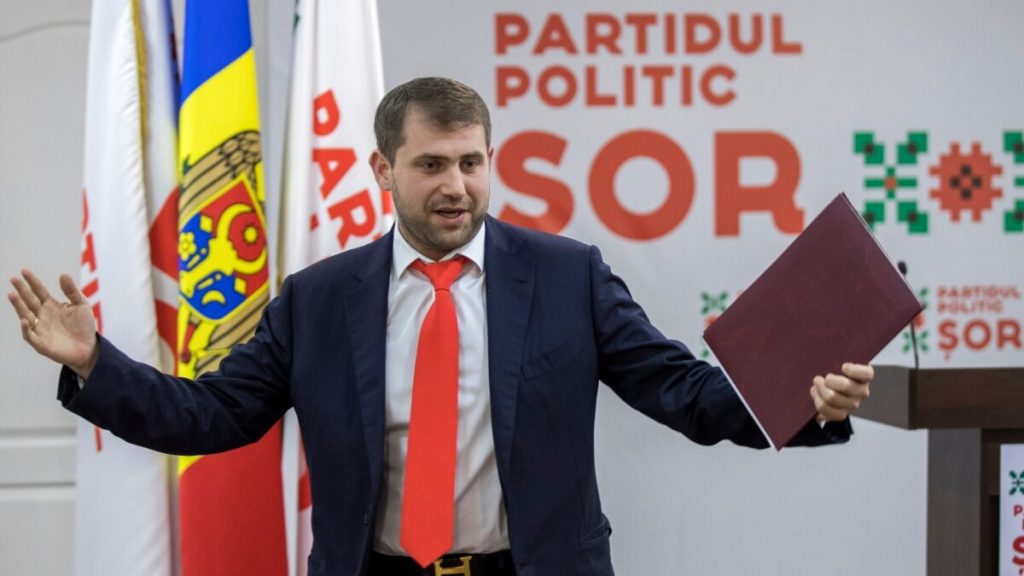
In the spring of 2023, Ilan Shor ensured that the previously unknown 37-year-old Evgenia Gutsul was elected head of Gagauzia, an autonomy in the south of Moldova. The region is known for its pro-Russian sentiments. Moscow also took part in the election of Evgenia Gutsul. The head of the Duma Committee on International Affairs, Leonid Slutsky, campaigned for her. In the local elections in November 2023, Shor planned to develop the Gagauz success elsewhere. The authorities responded to this by banning some of Ilan Shor’s political projects. First, in June 2023, the Constitutional Court of Moldova declared the activities of the Shor party illegal. According to the court’s conclusion, the political force acted contrary to the principles of the rule of law and threatened the sovereignty and independence of Moldova. It should be noted that, despite the ban, the Shor party remains very popular in Moldova. According to opinion polls, more than 8% of respondents are ready to vote for it.
After the ban on the Shor party, the fugitive oligarch created a new project called “Chance. Responsibilities. Implementation”, abbreviated as “block “S.O.R.”. The symbols and logo were almost identical to the party’s. However, on the eve of the elections, the ruling party, PAS, amended the electoral code. One of them prohibits mayors and deputies of various levels previously elected from parties declared unconstitutional from running for five years. This provision made it impossible for 600 members of the Shor party, which was banned by the Constitutional Court of Moldova, to participate in the current campaign. Also, in the amendments, there is a provision on the impossibility of using the attributes of unconstitutional parties by other political formations. Thus, the block “Chance. Responsibilities. Realisation” dropped out of the game. However, this did not become an obstacle for Ilan Shor himself: after new bans and restrictions came into force, Shor’s team began to actively use other political projects: “Chance”, “Renaissance”, and “Alternative Force for the Salvation of Moldova”.
After registration, the Chance party was headed by journalist Alexei Lungu, who immediately took the post of acting mayor of the city of Orhei – the birthplace of Ilan Shor and the place where the headquarters of the Shor party was located. Interestingly, the Romanian word for “chance” is “sansa”. The party chose the letter “S” as its logo. The surname Shor is written in Latin as “Sor”. The party declared European social-democratic values, and Alexei Lunga was also seen as a promising candidate for the presidential election. However, right on the eve of the vote, for reasons of state security, the Chance party was removed from the polls. The Moldovan intelligence services stated that Ilan Shor and the Russian intelligence services financed it.
The head of “Chance” Lungu was also not allowed to participate in the mayoral elections in Orhei. In response, Shor and “Chance” supported the representative of the “Alternative Force for the Salvation of Moldova” party, Tatiana Cociu, in Orhei. She received 57.6% of the vote, more than three times more than the ruling PAS candidate. An independent candidate supported by “Chance”, Arina Korsikova, had a good chance of success in the elections for the mayor of Balti, who entered the second round together with Alexander Petkov, the nominee of “Our Party” Renato Usatii. However, Korshikova was also removed from the elections, accusing her of connections with Shor and bribery of voters.
Judging by the results obtained in the local elections, the least successful project of Ilan Shor was the Revival party. This political force was created ten years ago by a former ally of ex-president Vladimir Voronin, Major General Vadim Mishin. For a long time, “Renaissance” existed only on paper. Vadim Mishin died, and the party went to his son, who was not involved in it. Then Ilan Shor took her under his “wing”, and the process, as they say, began. “Renaissance” became a “haven” for former socialists. The first defectors, members of parliament Alexander Nesterovsky and Irina Lozovan, despite the promise to create a new party, suddenly unexpectedly joined Revival. During the days when the Constitutional Court of Moldova was already considering the case of the Shor party, two more MPs from the PSRM, Vasile Bolea and Alexandru Suhodolski, were invited to Tel Aviv for a personal audience with Ilan Shor. Upon their return, they were expelled from the PSRM and joined the ranks of the new political project of Ilan Shor.
Speaking about the chances of the Revival party in local elections in the fall of 2023, experts considered three scenarios. First, if all members of Shor move to Revival, Revival will take over Shor’s rating completely, and they may have good chances in local elections. Second scenario: Shor and Revival will create a coalition, and then, again, Shor’s rating will play a role. Considering the Shor party’s ban and then the S.O.R. bloc’s exclusion from participating in the elections. Both scenarios became unrealistic. A third option is left – “Renaissance” will go to the polls on its own. As political expert Vyacheslav Berbeka noted, Revival will have no chance in the next local elections. And so it happened. Despite substantial financial investments, Revival won only one district – Taraclia.
Another political heavyweight with good presidential prospects is the mayor of Chisinau and leader of the National Alternative Movement (MAN) party, Ion Cebana. In the elections for the general mayor of Chisinau, he won, as they say, “with one goal” over his competitors, gaining 50.6% of the votes in the first round. PAS mayoral candidate Lilian Carp was unable to compete with Ceban. Karp finished second, gaining 28.3% of the votes. And although PAS calls Cheban a “pro-Kremlin mayor,” experts believe he can become a figure uniting the forces of the political centre.
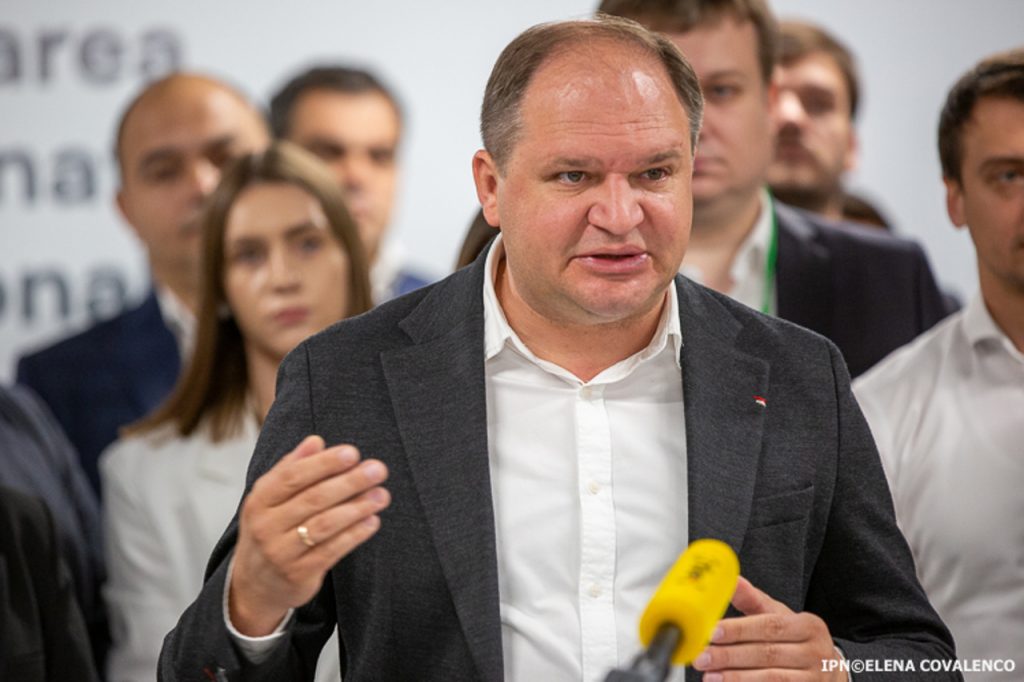
In 2019, Ceban was elected mayor of Chisinau as the PSRM candidate and, at that time, was a close associate of party leader Igor Dodon. However, Cheban broke up with the socialists and created his party, “MAN”, in 2022, which takes a centrist position. As the capital’s mayor, Ceban moved away from his previous positions, criticised Dodon’s pro-Russian line and even called the Moldovan language Romanian. Nevertheless, changing his political orientation is a common thing for Cheban.
Having started his political career in the ranks of the Communist Party, after their positions weakened, he defected to the socialists and then, taking the post of mayor of the capital, “left the deck” of the tilting socialist ship. Then Cheban created his political project – the MAN party. Ideologically, the party, although its leader criticises Maia Sandu, takes a position closer to the pro-European camp. Cheban positions his party as social democratic. Ceban advocates the European integration of Moldova and believes that “European integration should become a national idea.” At the same time, MAN opposes unionism (the idea of uniting Moldova with Romania). As for Cheban’s attitude to Russia’s full-scale aggression against Ukraine, the mayor of Chisinau is entirely on the side of Ukraine.
In the local elections, the MAN party received massive support from the residents of Chisinau, thanks to the mayor’s popularity. As a result of the elections, MAN formed a faction of 20 deputies in the Chisinau Municipal Council, equal in number to the PAS faction (in total, the Chisinau Municipal Council consists of 51 deputies). The success of the National Alternative Movement in the capital of Moldova essentially became a sensation in the 2023 local elections, and Ceban became a famous politician not only in the capital – as evidenced by his victory in the first round of mayoral elections – but throughout the country. According to data from the local sociological company Public Opinion Barometer, published on the eve of the 2023 local elections, his presidential rating was 5.6%. Many experts in Moldova, not unreasonably, see him as a genuine rival of Maia Sandu in the 2024 presidential elections.
However, the pro-government party PAS did not achieve its expected local election results. Although PAS finished first regarding the number of votes cast for its candidates, the results of the November 2023 elections indicate a decline in popularity. In the regions, PAS candidates took first place in 19 of the 32 district councils without an overwhelming majority, which led to the need to create coalitions. In another 40% of populated areas in Moldova, their representatives became mayors. But the party suffered defeat in large cities – primarily in Chisinau and Balti.
Summing up the election results, PAS Chairman, Speaker of the Moldovan Parliament Igor Grosu noted: “…despite the unprecedented intervention of a foreign state, PAS and the European candidate teams managed to get the best result in the country.” By the way, the third result in the elections was shown by another pro-European party – the European Social Democratic Party (formerly the Democratic Party of Moldova), from which 103 mayors and 88 district deputies were elected.
The relative failure of PAS in the local elections in November 2023 does not mean that support for the pro-European vector of the country’s development has significantly decreased in Moldova. As Moldovan political scientist and head of the Association for Participatory Democracy (ADEPT) Ioan Botan notes, parties advocating European integration of Moldova received more votes than political forces oriented toward Moscow. The 2023 local elections demonstrated not only the decline in the popularity of the ruling PAS party but also the weakness and fragmentation of the opposition. The results of the upcoming presidential and parliamentary elections will largely depend on whether PAS can form an alliance with other pro-European forces and whether opposition parties can overcome differences.
Transnistria: two in one
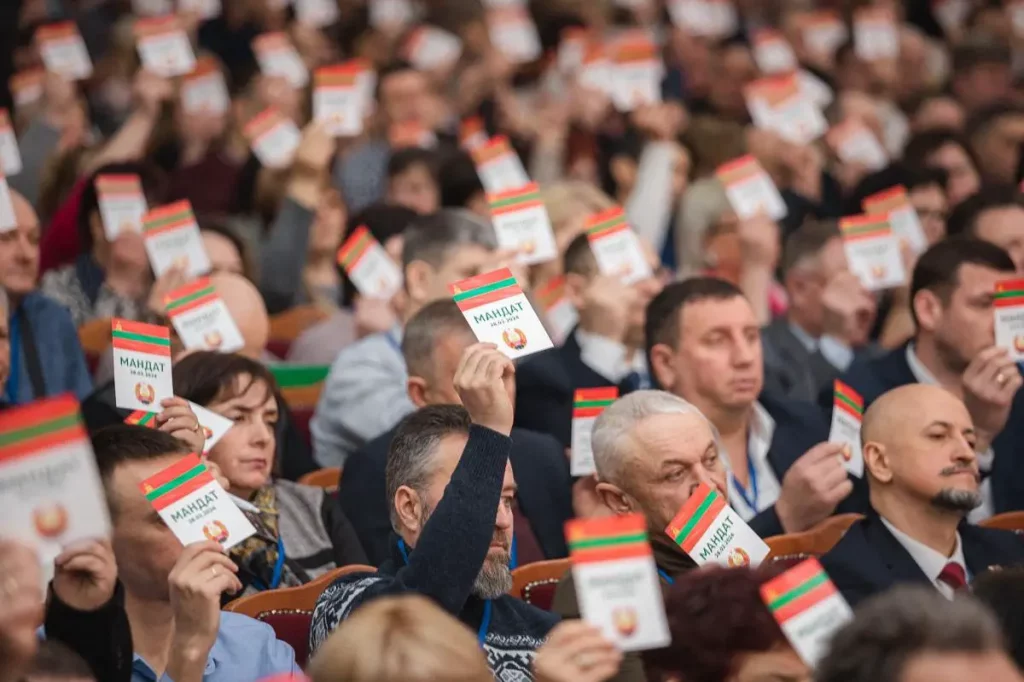
Speaking about the current state of the Republic of Moldova, it is impossible to ignore the problem of Transnistria. It is essential both from the point of view of further European integration of Chisinau and from the point of view of the country’s national security. For many years, the problem of Transnistria did not particularly “concern” the Moldovan authorities. It seemed that after the failure of the Kremlin’s plans to cut a corridor into Transnistria during Russia’s full-scale aggression against Ukraine, Chisinau had a chance to reintegrate the separatist region.
There is logic in this because without Moldova, Transnistria, in fact, has no connection with the outside world. For now, the Moldovan authorities are not showing much activity in resolving the conflict, hoping that Russia’s defeat in the war will create the necessary geopolitical prerequisites for this. And it will be possible to join the European Union without Transnistria. Moreover, Brussels does not rule out such a scenario. EU High Commissioner for Foreign Policy Josep Borrell confirms this possibility: “Moldova’s movement into the European Union does not depend on the events in Transnistria. Cyprus became a member of the EU, having territorial problems. Moldova can do this, too.”
Despite President Sandu’s statement that the start of negotiations on the country’s accession to the European Union is an excellent opportunity to unite the two banks of the Dniester and carry out the peaceful reunification of the country, it seems that, in fact, Chisinau is still rushing at full speed to the EU without Transnistria.
It is worth noting that relations between Moldova and Transnistria after the armed clashes of 1992 were by no means the same as those between Kyiv and the self-proclaimed “LPR” during the discussion of the “Minsk Agreements.”
Chisinau and the unrecognized “republic” got along quite peacefully. Nobody at the official level spoke about a military solution to the Transnistrian issue in Chisinau. Taking advantage of Moldova’s free trade regime with the EU, Tiraspol actively used the Made in Moldova brand: it sent a third of its exports to European countries through the right bank. The leading importer of Transnistrian products was Chisinau itself. Moreover, residents of the regions bordering Transnistria regularly visited Tiraspol since prices on the local market were consistently lower. And given that the distance between Chisinau and Tiraspol is about 70 kilometres, many capital residents did not refuse “shopping” in the unrecognized republic.
It should be added that before the war, about a quarter of Transnistrian trade turnover was with Ukraine, which continued until February 24, 2022. At the end of 2022, trade turnover between Kyiv and Tiraspol fell by more than half. Trade turnover with Russia has also decreased because, before the Russian invasion, the Transnistrians traded with Moscow through Ukrainian territory. And now, relations with external partners have become possible only through Moldova. Chisinau saw this “window of opportunity” and is trying to lead it to reintegration by complicating the already difficult economic realities of the Transnistrian region.
Chisinau’s first step in this direction was the adoption in February 2022 of amendments to the criminal code, providing for a prison sentence for separatism. The law caused a stir in Tiraspol. Local officials now hardly appear in Chisinau, fearing arrests. The most resonant decision was the abolition of customs benefits for business in Transnistria from January 1, 2024. Now, companies operating on the left bank of the Dniester must pay export-import duties to the Moldovan budget (in addition to payments to the Transnistrian one).
Most of all, entrepreneurs were outraged by the suddenness of this decision: they were simply presented with a fact. At the same time, Chisinau did not consider that about two thousand Moldovan enterprises operate on the left bank. The Transnistrian authorities responded by increasing their taxes and the cost of utilities. But Chisinau has not yet begun to reconsider the decision on duties and will not stop there. The Moldovan government’s plans for 2024 contain several innovations that are unlikely to please Transnistria. For example, Chisinau intends to ban the movement of cars with Transnistrian license plates. That is, Transnistrian motorists will have to receive either Moldovan license plates or neutral license plates previously agreed with Moldova.
Tiraspol seriously fears that, following customs duties, Moldova will decide to levy VAT and introduce excise taxes on fuel, alcohol, and tobacco. The whole complex of problems between Moldova and Transnistria, which have already been called an economic war, became the main reason that Tiraspol decided to convene a congress of deputies of all levels on February 28. Even before the congress, the press and experts from different countries were “hyping” on an entirely different topic: the unrecognised republic will ask Russia to recognise its independence and include it in the Russian Federation. The fact is that at the previous Congress of Deputies of Transnistria, which took place in 2006, Tiraspol turned to the Russian State Duma with a request to recognise the territory’s independence. As a result, it was decided to hold a “referendum”, in which, as the organisers reported, 97% of those who voted supported the entry of Transnistria into Russia. The State Duma responded by limiting itself to only “taking note” of the voting results.
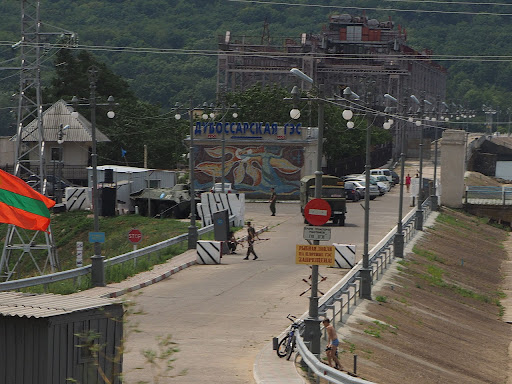
The topic was dispersed and “heated up” so much that Transnistrian politicians had to refute the intentions attributed to them. The appeal to Russia was eventually accepted without a request to join the Russian Federation. But in the document, the deputies of Transnistria addressed the Federation Council and the State Duma of the Russian Federation “with a request to implement measures for the diplomatic protection of Transnistria in the face of increasing pressure from Moldova.”
The president of the unrecognised republic, Vadim Krasnoselsky, accused Moldova of genocide and said that Chisinau had actually launched an economic war against Transnistria, which violates human rights and freedoms and blocks the normal functioning of the negotiation process. The congress’s address was addressed not only to Russia but also to the UN, OSCE, CIS, and even the EU. However, the main addressee of the message was still Chisinau.
Deputy Prime Minister for Reintegration in the Government of Moldova Alexandru Flenchea also believes and states that the congress in Tiraspol was “only a ritual act that completes a two-week campaign of political and psychological pressure on the Moldovan authorities,” and the addressee of political messages was and remains Chisinau, not Moscow. He also noted that “all Tiraspol wants to achieve is the abolition of import customs duties for Transnistrian companies introduced by Chisinau on January 1. Moreover, what concerns Tiraspol is not the duties as such (since most imports are subject to free trade agreements with the EU, CIS, and Turkey), but the fact of the continued inclusion of Transnistria under Moldovan jurisdiction.”
The Russian Foreign Ministry also responded to the congress’s appeal and responded rather restrainedly: “Protecting the interests of the residents of Transnistria, our compatriots, is one of the priorities.” “All requests are always carefully considered by the Russian relevant departments,” the department said. The USA also responded to the results of the congress. The head of the State Department press service, Matthew Miller, noted that Washington is closely monitoring Russia’s actions in the unrecognised Transnistria and said: “We continue to call on Chisinau and Tiraspol to work together and find solutions to pressing problems that concern residents on both sides of the Dniester.”
Today, it is evident that relations between Tiraspol and Chisinau are deteriorating. At the same time, the leadership of the unrecognised republic, despite loud statements, is looking for peaceful ways to reach an agreement. And turning, including to Moldova’s Western partners, they want to encourage the West to put pressure on President Sandu so that she returns to the previous format of economic relations between Moldova and the “PMR”. However, if the parties do not agree on customs and trade issues, then a complete blockade of Tiraspol by Chisinau cannot be ruled out, which simply will not allow goods from the unrecognised “republic” to pass through. And if this happens, then between the lines, you can read the threat of escalation of the conflict. The only question is to what level it will reach, where it will stop, and what Tiraspol and Moscow can do in reality.
In any case, it can be stated that despite taking the European course of the country’s development as a basis, Moldova still faces serious internal and external challenges, many of which can lead to a severe escalation of the situation both within the country and in the region as a whole. Having several contradictions, regional problems and geopolitical challenges, Moldova is approaching two election campaigns, each of which can seriously affect internal political stability and create entirely new trends. In this case, it can be noted that soon, Moldova will remain another critical factor in the geopolitical arena, capable of influencing the formation of a new world order.

